 HYANNIS – If the thought of a whole day of cooking on Thanksgiving or long lines at the mall makes you feel overwhelmed, there is plenty of good news about the health benefits of being thankful and generous. Best of all, you don’t need to make huge changes or threaten your budget to do it.
HYANNIS – If the thought of a whole day of cooking on Thanksgiving or long lines at the mall makes you feel overwhelmed, there is plenty of good news about the health benefits of being thankful and generous. Best of all, you don’t need to make huge changes or threaten your budget to do it.
“Sometimes you can change a person’s life just by listening to them, looking in their eyes or giving them a smile,” said cardiologist Elissa Thompson, MD, the medical director of the cardiac rehabilitation program at Cape Cod Hospital.
“Those kinds of things seem small but they are so important. They bring us together and make us acutely aware of how connected we actually are. Our world has become so fragmented because of busyness and the internet. Small gestures of kindness help us connect. Little acts of kindness are the meshwork of society.”
Giving makes us happy and happiness makes us healthy.
Sonja Lyubomirsky, a professor at the University of California, Riverside, has spent most of her professional life studying happiness. Since it’s hard to change a person’s natural disposition or life circumstances, she examined whether intentional activities could increase happiness. To do so, she asked people to perform five random acts of kindness each week for six weeks. Happiness blossomed, with one caveat – it is better to give for the benefit of others than it is to give for our own self-gratification.
The body of her work has revealed a multitude of benefits of happiness. Happy people have:
- Stronger social relationships
- Superior work outcomes
- More energy
- Stronger coping abilities
- Cooperate better.
Happiness also bolsters immune systems and even helps people live longer, proving that the old adage, “it’s better to give than receive,” is actually true.
Giving is related to oxytocin, the feel good hormone in our brains.
The presence of oxytocin, a hormone released during positive social interactions like giving gifts or nursing babies creates both trust and a greater sense of generosity. Paul Zak, the director of the Center for Neuroeconomics Studies at Claremont Graduate University in Claremont, CA discovered that giving people one dose of oxytocin made them 80 percent more generous than those who were given a placebo.
Give your time and you will help others and yourself.
To reap the health benefits of gratitude, you don’t need to hit the mall or spend any money. A series of studies reported by the non-profit Corporation for National & Community Service indicates that those who volunteer their time have lower mortality rates, greater functional ability and lower rates of depression later in life.
Research from Carnegie Mellon University shows that older adults who volunteer for at least 200 hours per year decrease their risk of high blood pressure by 40 percent.
Dr. Thompson advocates for patient to patient support. She’s seen it do wonders at Cape Cod Healthcare’s cardiac rehabilitation program in Hyannis. The 12-week program offers exercise and assistance in making lifestyle changes for those who are recovering from a heart attack. But, she says the informal support group aspect of the program is just as important.
“When you see how somebody else go through it, it helps and the people who are donating their experience are helped just as much,” she said.
Generosity and gratitude reduce stress.
When you focus on someone else’s well-being, it reduces your own stress levels. A study of 846 people in Detroit published in the American Journal of Public Health linked helping others with a reduced mortality over five years – despite life stressors.
Gratitude was shown to be equally healthy in a study of 962 Swiss adults. Those who count their blessings tended to report more vitality and less anxiety. An additional bonus is that gratitude helps people sleep better and more sleep is associated with better health.
Giving is contagious.
When we give to others, it not only helps the immediate recipient of our gift. It also causes a ripple effect through communities. James Fowler and a group of professors at the University of California, San Diego, did a study of social media that showed that when one person acted generously, it then inspired other people to “pay it forward” by acting generously towards others. Researchers followed each interaction and discovered that generosity tended to spread by three degrees, which can then lead out exponentially to affect hundreds of people.
It can also go viral. More than 17 million people participated in the “Ice Bucket Challenge” on Facebook in the summer of 2014. They raised $115,000 in just six weeks towards research for Amyotrophic Lateral Sclerosis (ALS), commonly known as Lou Gehrig’s disease.
So, be grateful and be generous this holiday season. It will not only help others, but will make you healthier in the process.























